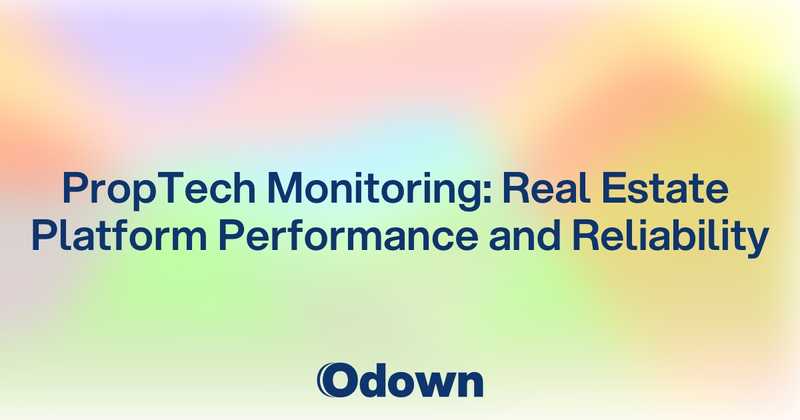PropTech Monitoring: Real Estate Platform Performance and Reliability
Your real estate platform handles thousands of property listings, virtual tours, and buyer inquiries daily. Your monitoring shows strong uptime and normal response times. Then your biggest real estate agent calls, furious: their million-dollar listing disappeared from search results just as a qualified buyer was about to schedule a showing. Meanwhile, virtual tours are failing to load on mobile devices, and your lead management system isn't tracking inquiries from your most expensive marketing campaigns.
You discover the underlying issues: your property search indexing failed silently, causing high-value listings to become invisible. Virtual tour streaming worked fine on desktop but couldn't handle mobile bandwidth variations. Lead tracking worked perfectly for web forms but missed mobile app inquiries due to integration failures. Your technical systems were stable, but your real estate business was hemorrhaging opportunities.
PropTech monitoring requires understanding the unique dynamics of real estate transactions where timing matters enormously, where visual content is critical for decision-making, and where failed connections between buyers and sellers represent immediate lost revenue. Real estate technology must work flawlessly during the brief windows when buyers are actively searching and ready to make decisions.
Property Search and Listing Platform Monitoring
Real estate search platforms must deliver accurate, up-to-date property information with the performance that matches the urgency of real estate decisions.
Property Search Performance and Accuracy
Real estate search functionality requires specialized monitoring because search relevance directly affects buyer engagement and transaction success.
Search query performance monitoring tracks response times for property searches across different criteria including location, price range, property features, and availability status.
Search result accuracy monitoring validates that search results match query parameters and that property information displayed in search results reflects current listing status.
Geospatial search monitoring tracks location-based searches and mapping functionality that enables buyers to find properties in specific neighborhoods or geographic areas.
Filter and refinement monitoring tracks advanced search features that help buyers narrow results based on property characteristics, amenities, and personal preferences.
Search ranking algorithm monitoring ensures that property listings appear in search results according to relevance, recency, and business logic rather than technical glitches.
Listing Data Integrity and Synchronization
Property listing accuracy is critical because incorrect information can waste time for buyers, sellers, and real estate agents.
Multiple Listing Service (MLS) integration monitoring tracks data synchronization between real estate platforms and authoritative MLS databases that provide official property information.
Property status update monitoring ensures that listing status changes (available, pending, sold) propagate quickly across all platform components to prevent showing unavailable properties.
Pricing update monitoring tracks property price changes and ensures that current pricing displays accurately across search results, detail pages, and marketing materials.
Property detail accuracy monitoring validates that property descriptions, features, and specifications remain consistent across different platform sections.
Image and media synchronization monitoring ensures that property photos and virtual tours associate correctly with listings and display consistently.
Market Data and Analytics
Real estate platforms often provide market analytics that require accurate data aggregation and analysis.
Comparative market analysis (CMA) monitoring tracks automated property valuation and market comparison features that help buyers and sellers understand property values.
Market trend monitoring tracks neighborhood analytics, price trends, and market statistics that inform real estate decisions.
Property history monitoring tracks price changes, sale history, and other historical data that affects property valuations and buyer decisions.
Neighborhood data integration monitoring tracks demographic information, school ratings, crime statistics, and other location data that influences real estate decisions.
Search Engine Optimization Monitoring
Real estate platforms depend heavily on organic search traffic for lead generation and property discovery.
SEO performance monitoring tracks how property listings perform in Google and other search engines for relevant real estate queries.
Local SEO monitoring tracks how property listings appear in local search results and map listings that are critical for location-based real estate searches.
Property listing schema monitoring ensures that structured data markup helps search engines understand and display property information correctly.
Page indexing monitoring tracks how quickly new property listings get indexed by search engines and become discoverable through organic search.
Virtual Tour and Media Streaming Performance Monitoring
Real estate visual content requires high-quality delivery because property presentation directly affects buyer interest and decision-making.
Virtual Tour Platform Performance
Virtual tours have become essential for real estate marketing and require specialized monitoring to ensure optimal user experience.
360-degree tour loading monitoring tracks how quickly immersive property tours load and become interactive for potential buyers.
Virtual reality (VR) compatibility monitoring ensures that virtual tours work correctly across different VR devices and browsers that buyers might use.
Interactive hotspot monitoring tracks clickable areas within virtual tours that provide additional property information or navigation between rooms.
Tour navigation performance monitoring tracks smooth transitions between rooms and viewpoints within virtual property tours.
Mobile virtual tour monitoring ensures that property tours work effectively on smartphones and tablets that many buyers use for initial property research.
High-Resolution Image and Video Delivery
Property photography and videography require reliable delivery with quality that showcases properties effectively.
High-resolution image loading monitoring tracks delivery of professional property photos that are essential for effective property marketing.
Property video streaming monitoring tracks promotional videos and walkthrough content that help buyers understand property layouts and features.
Image gallery performance monitoring tracks photo browsing functionality that allows buyers to examine property details thoroughly.
Drone footage and aerial photography monitoring tracks specialized property media that provides unique perspectives on properties and neighborhoods.
Progressive image loading monitoring optimizes image delivery for different connection speeds while maintaining visual quality that supports buying decisions.
Content Delivery Network (CDN) Optimization
Real estate media requires global content delivery that performs well for buyers accessing properties from different locations.
Geographic CDN performance monitoring tracks how property media loads for users in different regions who might be relocating or investing remotely.
Bandwidth optimization monitoring ensures efficient delivery of large media files without compromising quality that buyers expect for property evaluation.
Cache performance monitoring tracks how effectively property media is cached to reduce loading times for frequently viewed listings.
Mobile CDN optimization monitoring ensures that property media loads efficiently on mobile devices with varying connection speeds.
Real Estate CRM and Lead Management System Monitoring
Real estate CRM systems must track leads reliably because missed opportunities in real estate often cannot be recovered.
Lead Capture and Attribution
Real estate lead generation requires comprehensive tracking because leads come from multiple sources and channels.
Lead form monitoring tracks property inquiry forms, showing requests, and contact forms that generate sales opportunities for real estate professionals.
Call tracking monitoring tracks phone inquiries and ensures that calls from property listings reach the appropriate real estate agents reliably.
Email inquiry monitoring tracks email-based property inquiries and ensures reliable delivery to listing agents and sales teams.
Social media lead integration monitoring tracks inquiries and leads generated through social media marketing campaigns.
Marketing campaign attribution monitoring tracks which marketing channels generate the highest quality leads and best conversion rates.
CRM System Performance and Reliability
Real estate CRM systems require high reliability because agent productivity and client relationships depend on system availability.
Contact management monitoring tracks how efficiently CRM systems store, organize, and retrieve client and prospect information.
Communication history monitoring tracks email, phone, and text message history that helps agents maintain consistent client relationships.
Task and follow-up monitoring tracks automated reminders and scheduled activities that ensure consistent client communication.
Pipeline management monitoring tracks deal progression and identifies bottlenecks that might prevent transaction completion.
Document management monitoring tracks contracts, disclosures, and other real estate documents that are essential for transaction completion.
Agent Productivity and Performance
Real estate CRM monitoring should track metrics that help improve agent effectiveness and client service.
Agent activity monitoring tracks calls, emails, showings, and other activities that indicate agent productivity and client engagement.
Response time monitoring tracks how quickly agents respond to inquiries and client communications, which affects conversion rates and client satisfaction.
Conversion rate monitoring tracks how effectively leads convert to showings, offers, and completed transactions.
Client satisfaction monitoring tracks feedback and ratings that indicate service quality and agent performance.
Integration with Real Estate Tools
Real estate CRM systems often integrate with specialized tools that require monitoring for complete workflow functionality.
MLS integration monitoring tracks how CRM systems connect with Multiple Listing Services for property research and client matching.
Transaction management integration monitoring tracks connections with escrow, title, and closing services that support transaction completion.
Marketing automation integration monitoring tracks email campaigns, social media posting, and other marketing activities managed through CRM systems.
Calendar and scheduling integration monitoring tracks showing appointments and client meetings managed through CRM platforms.
PropTech Mobile App Monitoring: Property Discovery and Communication
Mobile apps are critical for real estate platforms because buyers often begin property searches on mobile devices and expect seamless mobile experiences.
Mobile Property Search Performance
Real estate mobile apps require optimized search functionality because mobile users often search for properties while physically visiting neighborhoods.
Mobile search speed monitoring tracks how quickly property searches return results on mobile devices with varying processing power and network conditions.
Location-based search monitoring tracks GPS-enabled property searches that help buyers find properties near their current location.
Map integration monitoring tracks interactive property maps that allow buyers to visualize property locations and neighborhood characteristics.
Saved search and notification monitoring tracks alerts for new properties that match buyer criteria, which is essential for competitive real estate markets.
Offline search capability monitoring tracks how well mobile apps function when network connectivity is limited or unavailable.
Mobile Communication Features
Real estate mobile apps often include communication features that connect buyers with agents and facilitate property inquiries.
In-app messaging monitoring tracks communication between buyers and real estate agents directly within mobile applications.
Push notification monitoring tracks property alerts, message notifications, and appointment reminders that keep buyers engaged with properties and agents.
Video calling integration monitoring tracks virtual showing capabilities and real-time communication between buyers and agents.
Photo sharing monitoring tracks how buyers can share property photos and information with family members and decision-making partners.
Mobile User Experience Optimization
Mobile real estate apps must provide excellent user experience because property decisions often involve emotional responses that can be affected by technical frustration.
App startup time monitoring tracks how quickly real estate apps launch and become usable on different mobile devices.
Image loading optimization monitoring ensures that property photos load efficiently on mobile devices with varying connection speeds.
Touch interface responsiveness monitoring tracks how smoothly mobile apps respond to user interactions including scrolling, tapping, and gesturing.
Battery usage monitoring tracks how efficiently real estate apps use device battery, which affects user willingness to keep apps installed and active.
Mobile app crash monitoring tracks application stability and identifies issues that might prevent users from completing property searches or inquiries.
Cross-Platform Mobile Performance
Real estate platforms must work consistently across iOS and Android devices that buyers use.
iOS performance monitoring tracks real estate app performance across different iPhone and iPad models and iOS versions.
Android fragmentation monitoring tracks app performance across the wide variety of Android devices and versions that users might have.
Cross-platform feature parity monitoring ensures that essential real estate features work consistently across different mobile platforms.
Mobile web performance monitoring tracks real estate platform performance in mobile browsers for users who don't install dedicated apps.
App store optimization monitoring tracks how real estate apps perform in app store searches and download metrics that affect user acquisition.
PropTech monitoring transforms real estate technology from reactive problem-solving into proactive opportunity creation that supports successful real estate transactions. Instead of discovering technical issues after they cost deals, you identify and resolve problems before they affect buyer engagement or agent productivity.
The investment in comprehensive PropTech monitoring pays dividends in improved lead conversion, better client satisfaction, and protection of high-value real estate opportunities that might be lost due to technical failures. You finally get the visibility needed to ensure that technology enhances rather than hinders real estate success.
Ready to implement comprehensive PropTech monitoring? Odown provides real estate-focused monitoring that tracks property search performance, media delivery, and lead management alongside traditional uptime monitoring. Combined with our EdTech monitoring expertise, you'll have monitoring strategies that work for both transaction-focused real estate platforms and engagement-focused educational technology environments.



